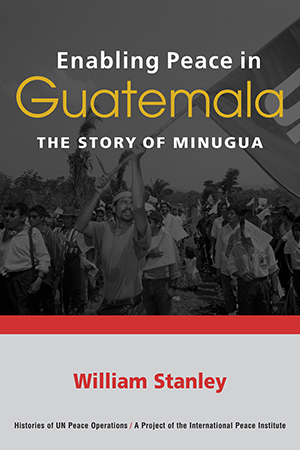
- 2013/325 pages
- Histories of UN Peace Operations/A Project of the International Peace Institute
Enabling Peace in Guatemala:
The Story of MINUGUA
Hardcover: $65.00
ISBN: 978-1-58826-656-9
Paperback: $25.00
ISBN: 978-1-58826-681-1
Ebook: $25.00
ISBN: 978-1-62637-645-8
William Stanley tells the absorbing story of the UN peace operation in Guatemala's ten-year endeavor (1994-2004) to build conditions that would sustain a lasting peace in the country.
Unusual among UN peace efforts because of its largely civilian nature, its General Assembly mandate, and its heavy reliance on UN volunteers to staff field offices, the mission (MINUGUA) focused initially on human rights. Beginning in 1997, however, its scope expanded to include verification of the full range of peace accords designed to end nearly four decades of civil war between the government and the revolutionary insurgency.
MINUGUA faced a challenging political context. The government that signed the peace accords proved unable or unwilling to implement them, and the progress of successive governments was modest at best. The mission also grappled with uncooperative political elites and persistent state corruption, organized crime, and social inequality. Stanley chronicles a series of strategic—and sometimes experimental—choices from the UN's point of view and provides a cautionary tale about the limits of international benevolence.
Unusual among UN peace efforts because of its largely civilian nature, its General Assembly mandate, and its heavy reliance on UN volunteers to staff field offices, the mission (MINUGUA) focused initially on human rights. Beginning in 1997, however, its scope expanded to include verification of the full range of peace accords designed to end nearly four decades of civil war between the government and the revolutionary insurgency.
MINUGUA faced a challenging political context. The government that signed the peace accords proved unable or unwilling to implement them, and the progress of successive governments was modest at best. The mission also grappled with uncooperative political elites and persistent state corruption, organized crime, and social inequality. Stanley chronicles a series of strategic—and sometimes experimental—choices from the UN's point of view and provides a cautionary tale about the limits of international benevolence.





